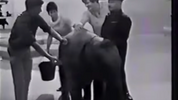Today we take it for granted that at the click of the mouse we can talk to, be seen with, and connect to virtually anyone around the globe.
The world we live in today is more globally connected at a community level than any time in history.
At time of writing circa 60%+ of the world's population are trying to figure out how to talk to other people, many from so called established economies, to those in the developing world.
They say that communities can only grow where there has been the seeds of a 'network' with a common interest sown - common interest (positive/negative) is fuelled by how something makes us feel, and is based on how we 'experience' things.
Many millennia ago when we started those early migrations from continent to continent and region to region we formed our communities based on very few simple things such as shared survival goals and values e.g. hunting, fishing, crafting.
An overly simplified view perhaps but all this required us to become more 'social' in order for us to be able to connect and merge with other like minded communities, and most of this happened based on 'how we feel' about those we are connecting into.
The principles around this behaviour hasn't changed much despite thousands of years of so called evolution, innovation, and economic progress.
As this pandemic accelerated the demise of many businesses in the retail sector (and others) what we see is a surge in innovative entrepreneurs eager to evolve around what was, to 'what can be'.
A lot of this is happening not just in the online and digital space but also in high streets up and down the country.
A company called 'Gravity' is taking space in what is now redundant space left behind as a result of the demise of the department store sector as we had known it.
"We've been talking about how to save the High Street for more than a decade but the pandemic has turbo charged the problems now. This needs people to come together. I think it's a significant moment and a really big opportunity, particularly for those centres and high streets where there is no future for retail, for radical, bold, thinking. I think it could be exciting."
In an old 'Debenhams' department store in the old beauty hall of the Debenhams store in south-west London people are about to enjoy a variety of 'experiences'.
"We're creating a department store of fun," says Michael Harrison, the co-founder of 'Gravity' which is due to open on 1 August.
"We have three bars, two restaurants, go-karting, a bowling alley, huge screens to watch sporting events and adventure golf. This is the future of the High Street. It's about experience," he says.
How we 'experience' something has a profound impact on who we socialise with, who we do business with, and who we might buy something from.
In former years we gained exposure to a brand and a company via adverts e.g. what they (the brand) told us they were, if we liked what they were saying we would then look to 'experience' the store, or the company to assess our 'purchase' decisions - all very much a physical process.
Today we have access to so much more information, as such we no longer have to rely on what the company and brand are telling us about them, we can look to gain more 'experiential proof' from our peers, business associates, including friends and family.
Back to the Debenhams store and the 'experience' innovation brought about by brands like 'Sook' and 'Gravity' - shoppers are stopping to take photos when the shutters briefly opened giving a glimpse of the flashing lights and builders beavering away inside.
And just like you and me, they are amplifying the 'brand experience' to their social networks, which if you think about it is essentially free, highly recommended word of mouth for the modern age.
It's called 'Social Networking', and its very much like the sort of stuff our earlier ancestors did.
Traditional return on investment (ROI) metrics are no longer sufficient on their own to determine your company’s success. Evaluating whether your value proposition, capabilities, and portfolio of products and services will create shareholder value requires laser focus on how well you’re meeting higher expectations around the customer experience.
Maybe it's time to wake up and realise that today's consumer doesn't have to read or watch your intrusive adverts, maybe its time to better understand how they're going about their own research on you, your employees, and your company long before they have even thought about talking to you, and all those interactions will showcase how they and others have 'experienced' what it is you 'think you do'.
Michael has no shortage of retail landlords now ringing him up offering him potential new locations. They're grappling with the need to rethink, or repurpose, empty shops. Latest figures suggest one in seven stores, on average, are lying vacant. And in some places the number is far higher.
 unknownx500
unknownx500











